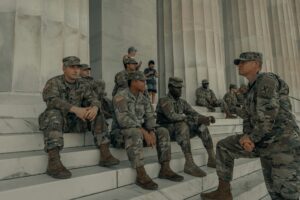From Battlefield to Boardroom: Applying Military Leadership in Business


Leadership forged in the military is built on clarity, resilience, and accountability—qualities that translate powerfully into the business world. As organizations face increasing uncertainty and rapid change, many are turning to principles shaped in the armed forces to inspire more effective leadership. Whether it’s leading under pressure or motivating a diverse team, military-trained leaders offer tested strategies that can elevate any business environment. This article examines how military leadership traits can be leveraged to enhance corporate performance, culture, and adaptability.
Purpose-Driven Leadership
Military leaders operate with a clear mission and a deep sense of duty. Every action is aligned with an overarching goal, instilling a purpose-driven approach to leadership. In a corporate setting, this translates into goal alignment, where every team member understands not only what needs to be done but why it matters.
Business leaders can adopt this principle by clarifying company objectives, establishing measurable outcomes, and consistently reinforcing the “why” behind each strategy when employees feel connected to a meaningful mission, engagement and accountability rise.
Command Clarity and Decision Ownership
The chain of command in the military ensures that roles, responsibilities, and decision-making authority are clearly defined and understood. This structure minimizes confusion, especially in high-pressure situations, and facilitates swift and effective responses.
In business, especially during crises or organizational shifts, leaders must provide the same level of clarity. Defining who owns which decisions—and empowering those individuals to act—creates a sense of order and confidence. Leaders who emulate this style reduce ambiguity and build trust across teams.
Precision and Execution Discipline
The military thrives on precision and discipline—traits that are just as valuable in business. Meeting deadlines, maintaining high-quality standards, and executing plans with reliability are all reflections of a disciplined organizational culture.
Executives who promote discipline, punctuality, and attention to detail foster operational excellence. When teams understand the importance of follow-through and consistency, they are better equipped to meet strategic goals with reliability and integrity.
Flexibility Amid Uncertainty
Adaptability is second nature to military leadership personnel, who are often trained to rapidly adjust their plans in response to evolving threats or unexpected challenges. This agility is equally valuable in the business landscape, where economic volatility and innovation cycles can create disruption.
A flexible leader anticipates change and prepares accordingly. Tools like scenario planning, contingency strategies, and agile frameworks—common in military operations—can help businesses pivot effectively while maintaining momentum and morale.
Trust-Building and Unit Cohesion
In the military, unity is critical. Service members train, live, and operate as a cohesive unit, developing strong bonds of trust and mutual respect. In business, trust fosters collaboration, creativity, and resilience in the face of pressure.
Leaders can build trust by encouraging open communication, recognizing contributions, and modeling vulnerability. When employees feel psychologically safe and supported, they take ownership of their work and collaborate more effectively—just like a high-performing military unit.
Adaptive Leadership Styles
Military officers are trained to tailor their leadership style depending on the mission, team experience, and context. Known as adaptive or situational leadership, this flexibility allows for better engagement and performance.
In a business setting, leaders must also shift between coaching, directing, and delegating as circumstances require. Recognizing when a team needs guidance versus autonomy is a subtle but powerful skill that drives productivity and morale.
Planning with Precision and Foresight
Strategic planning in the military involves risk assessment, logistics, and long-term thinking. Every mission is meticulously planned with contingencies in mind. This same rigor benefits businesses as they set priorities, allocate resources, and pursue long-term goals.
Corporate leaders can benefit from adopting structured planning processes that emphasize preparation, scenario analysis, and clear communication of strategic objectives. Strategic clarity helps align teams and ensures smoother execution across departments.
High-Stakes Communication
Clear, concise, and purposeful communication is vital in military operations, especially under stress. Orders must be understood instantly, with no room for misinterpretation. The ability to convey essential information quickly and effectively is just as important in business.
In the corporate world, leaders who communicate clearly set expectations, manage conflicts more effectively and foster alignment. They also listen actively—another key military trait—ensuring feedback flows in both directions.
Developing the Next Generation of Leaders
The military excels at cultivating leaders through structured mentorship, formal education, and hands-on training. Leaders are constantly preparing their successors, ensuring continuity and resilience within their units.
Businesses that prioritize leadership development see higher engagement, stronger internal promotions, and better retention. Whether through mentorship programs or ongoing education, investing in talent strengthens the organization and prepares it for future challenges.
Leading with Integrity
Integrity is a foundational value in military service. Whether in the field or the command center, leaders are expected to act ethically, make difficult decisions honestly, and place the mission above personal gain.
Bringing military leadership principles into business isn’t about enforcing rigid command structures—it’s about instilling discipline, trust, adaptability, and strategic clarity into how teams operate. Whether you’re managing a small startup or a global enterprise, these time-tested principles can sharpen your leadership skills, strengthen team performance, and enhance organizational resilience.
The transition from battlefield to boardroom proves that leadership is not bound by industry or uniform. With the right mindset and application, the values that guide military service can fuel business success in extraordinary ways.





